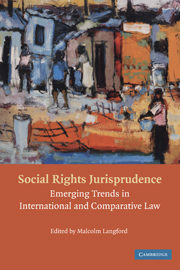Book contents
Foreword – Philip Alston
Published online by Cambridge University Press: 05 June 2012
Summary
This book provides eloquent testimony to the fact that the debate about the justiciability of social rights has come of age. For many years the debate was dramatically stuck in the mire of what might be termed a name-calling phase, in which opponents contented themselves with proclaiming that social rights were simply not susceptible to judicial review and implementation. This argument was pursued with particular vigour by those who clung to the old certitudes that social rights were by their very nature ‘positive’ and thus not amenable to judicial consideration. In contrast, civil and political rights were said to be inherently ‘negative’ and were thus eminently well suited to being litigated in courts. Indeed, despite a literature which is by now extensive, and which very effectively debunks this simplistic dichotomy, such arguments are still made by some participants in the international human rights debate. By and large, however, the growing number of social rights cases decided by judicial and quasi-judicial institutions, the range of issues they deal with, the diversity of jurisdictions in which they have occurred, and a thriving scholarly literature have combined to make such debates largely irrelevant in practice.
After the name-calling phase, the second phase in the international debate over justiciability was largely devoted to enthusiastic discussions of the jurisprudence emerging from the South African Constitutional Court in its application of the provisions of the South African Constitution.
- Type
- Chapter
- Information
- Social Rights JurisprudenceEmerging Trends in International and Comparative Law, pp. ix - xivPublisher: Cambridge University PressPrint publication year: 2009



